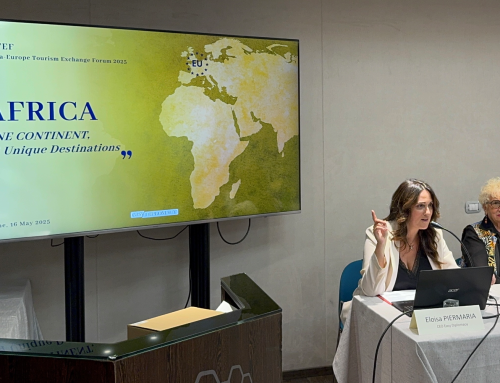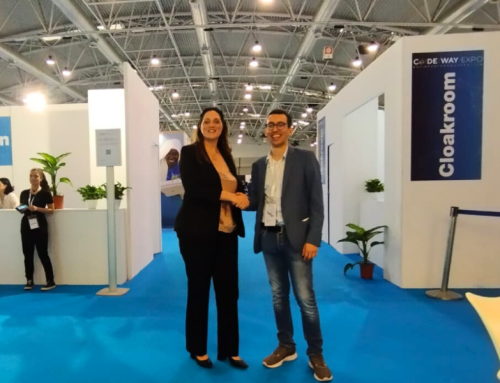Rome, 27th October 2022
The Hub to better sell the Destination
Digital Tourism Marketing aims to show and increase the Value of a Destination by using multimedia content (audio, video, images, etc). These can leverage both on the emotional and experiential side as well as on the business opportunities the destination can offer to foreign companies.
The evolution of communication techniques has led to the creation of tourist hubs, independent networks that cooperate on a local or global basis to offer strategies, products, and tailor-made services.
Hubs are living, dynamic realities that, if well managed, can ‘literally’ sell the destination, to the foreign entrepreneur as well as to the simple tourist.

The Quality of a Tourist Destination
The UNWTO, the United Nations World Tourism Organization, has defined the quality of a tourist destination as «result of a process which implies the satisfaction of all tourism product and service needs, requirements and expectations of the consumer at an acceptable price».
Among the various aspects taken into consideration, there are «ethics, transparency and respect for the human and natural environment. Quality is a key element of competitiveness, it is also an organizational and operational can tool».
Also as defined by UNWTO, a «tourism product is a combination of tangible and intangible elements» around a centre of interest. This is a cornerstone of tourism marketing, a mix of experiences and emotional aspects aimed at the potential consumer. The product is then evaluated and distributed throught different channels, setting its ‘life cycle’ in motion.
Tourism Marketing
Tourism marketing does not only work for the promotion of a destination, but for the generation of a brand awareness that can attract tourists. The Tourism Market Intelligence and Competitiveness is a UNWTO department responsible for sharing know-how and guidelines in support of tourist destinations. Through efficient governance, the goal is to create a one-stop shop for trends and forecasts on how the tourism industry will evolve.
The action plan to make destinations more competitive concerns the management, planning and development of the tourism product and its branding.
Digital Tourism
Digital Tourism, in turn, exploits all means of communication. This multimediality allows the organization and management not just of simple travels or promotional pages, but of real experiences that are increasingly customizable.
Tourism, like other sectors of the market, has benefited from new technologies, which have redesigned not only the offer, but also the approach to travel. Digitalization, accelerated by the pandemic, has given new dynamism to the proposals and to the users themselves, who now know how get informed and move around autonomously.
In fact, it is not just about booking your favorite destination online. Digital tourism is the process that drives all the experience and internet is central. It can influence choices through user reviews, whether it’s a hotel, a restaurant, or a place of interest. A research by the Easy Jet airline in 2019 found that more than half of the tourists were affected by images seen on Instagram. Basically, digitalized word-of-mouth.

Place Marketing – much more than a travel agency
Although in some aspects (the less technical ones) it may seem like the work of a tourist agency or tour operator, the hub starts from a totally different concept, which is that of Place Marketing. It is not about advertising a destination and selling trips and stays. The strategy is aimed at strengthening a local identity, building a Country Brand.
Place marketing needs a careful preliminary phase, of study the socio-economic characteristics of a specific region. The territory is ‘unpacked’ to identify the economic and tourist opportunities and potential, the typical features and uniqueness through which to attract investors and tourists.
It goes far beyond just advertising and creating a website. A series of insights are contemplated for the enhancement of the offer and destination. An example is the Combria hub (https://www.cumbriatourism.org/), a renowned British region, “promote your business and the beautiful destination we live in”.
Through a hub, you can find answers to all types of questions, from the type of taxation to the availability of building areas. Such as the hub for attracting investiment in Zambia (https://investzambia.zda.org.zm/), thanks to the business opportunities cards, technical sheets that summarise all the useful information for starting a business in the area, such as timing and methods, tax information, identification of the most effective business channels and more. The co-participation of public institutions acts as a guarantee, which confers confidence in the information.
Promotion of the Destination
Once the hub has been created, a Communication Plan is needed to promote the destination to make the contents visible and, therefore, facilitate its sale. The methods can be the most diverse, from planning a press office, to the organization events, from participation in trade fairs to the organization of Fam Trips and Business Delegations, depending on the county’s assets identified. A good Communication Plan can bring the potential user to an awareness of what the destination is, from a cultural, craftmanship, food and wine or business point of view.
The Easy Diplomacy Proposal
 More than other sectors, tourism has suffered from global restrictions due to the pandemic. And more than other sectors, it can restart even stronger, just as a response to long periods of forced closures at home and borders. Covid-19 has reiterated to us many models of the past were no longer sustainable and that we may well be able to evolve. Tourism is doing it, thanks also to technological support, which is crucial.
More than other sectors, tourism has suffered from global restrictions due to the pandemic. And more than other sectors, it can restart even stronger, just as a response to long periods of forced closures at home and borders. Covid-19 has reiterated to us many models of the past were no longer sustainable and that we may well be able to evolve. Tourism is doing it, thanks also to technological support, which is crucial.
The creation of a tourism hub in synergy with the Government is one of the Solutions implemented by Easy Diplomacy for an increasingly focused Place Marketing. The Proposal is the creation of smart and dynamic contents enabling the development of useful and practical services for public and private shared hubs, made usable by all thanks to the digital communication.





